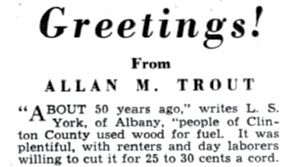Correspondence from L.S. York – Part 1


“Based upon the sagacious singularity of life back in the days when ridge runners not only had no place to go, but nothing to do when they got there.”
Between January 1939 and December 1967, Allan Trout wrote a popular daily column in the Louisville Courier-Journal. “Greetings” focused on folklore, humor and “barnyard science” and attracted a loyal following and regular correspondence between Trout and his readers. For many of those years, one such correspondent was L.S. York of Albany.
Leander Sylvester York was a merchant and postmaster before embarking in 1897 on a 35-year career as a school teacher in Clinton, McCreary and Wayne counties, and in South Georgia. He served as Superintendent of Clinton County schools from 1922 to 1929.
“I well remember,” he wrote in the newspapers December 11, 1950 edition of the Courier-Journal, “the old log meeting house where we went to school. It had a big fireplace and backless benches. How we squirmed and turned on those old benches! And in cold weather, how we gathered around the chunk fire! My blueback speller cost only two cents, but my father had to buy it and then it was up to me to keep it as neat as possible. I used thumb paper to keep the leaves from wearing out, and my mother made jackets of brown cloth or brown paper to protect the backs.”
In the February 26, 1953 edition of the Courier-Journal he wrote, “There once lived in Clinton County an old man by the name of George Wright. His vocal cords were maladjusted, making his voice subject to break without warning from coarse bass to fine tenor. One day while driving down the road his team of mules got frightened, ran away, turned the wagon over and pinned uncle George under the wagon box. He was compelled to lie there helpless until help came. At last a man walked by and uncle George cried out, ‘Stranger,” he yelled in bass voice, ‘Help me,’ this in tenor. The man stopped, and again came the call for help, in voices both low and high. “If two of you are under that wagon box you don’t need help,” said the man, to which uncle George replied frantically, “Stranger, jist one, by gum, jist one!”
In the October 13, 1952 edition of the newspaper, L.S. wrote: “As a boy I remember going to Albany with my father and they’re seeing a distinguished-looking man with heavy eyebrows and a pipe in his mouth. From my father I learned the heavy smoker was J.A. Brents. Some people called him Allan Brents and others called him Major Brents. Major Brents was a leading lawyer of his day and enjoyed an extensive practice. On one occasion he was retained to help defend a man charged with the murder of his neighbor during a quarrel over some fodder. The judge before whom the case was tried did not permit smoking in the courtroom. The trial lasted several hours. Major Brents found it exceedingly hard to forego his pipe for so long. The urge to smoke was about to overwhelm him. It was a dry and hankering mouth, therefore, that the Major rose to deliver his closing arguments to the jury. After outlining the facts as seen by the prosecution, he set out to impress upon the jury the petty nature of the quarrel that caused the defendant to kill his neighbor. ‘Just think of it, gentlemen of the jury,’ he said. ‘This defendant killed a man over a stalk of tobacco.’ ‘Fodder, Major,’ gently corrected the judge. ‘Ah yes, fodder. Thank you, your honor,’ replied the lawyer. And then he continued to press home his terrible condemnation of so trivial a cause of murder. His voice hit the high pitch and he arose to new heights of eloquence. ‘And I say to you, gentlemen of the jury,’ he shouted, ‘any man who’d kill his neighbor over a stalk of tobacco…’ This time the judge was not so gentle. Sternly, he said from the bench, ‘FODDER MAJOR!’ It at last dawned upon the Major he was in no condition to continue. He quickly closed his argument, made a bee line for the door, lit his pipe, and was soon swallowed by a cloud of smoke.”
“I am reminded of a story a neighbor once told me,” he wrote in the November 2, 1946 edition of the Courier-Journal. He was a Mason and had quite a lot of fun out of his connection with masonry. The neighbor said a woman of glib tongue kept after him to give her a Masonic sign and password. At last, after pledging her to life-long secrecy, the neighbor told her: ‘Sit on the floor. Put your right thumb in your left eye and put your left thumb in your right eye. Hold the position 10 minutes. That will be a Masonic sign. At the end of 10 minutes, jump as high as you can, uncover your eyes and yell — Whoopee! I see! That will be a Masonic password.’ The neighbor said the woman then told him she would expose Masonry before sunset.”
And then in the July 28, 1956 edition of the newspaper he wrote, “When I was a lad of six or seven, I remember going to the graveyard as people called it then, when my grandmother was buried. It was cold and the crowd that gathered was small, but I remember a fragment of a song they sang on that occasion:”
‘In the low and silent grave
We shall sleep, but not forever
In that home beyond this vale
We shall meet to part, no never’
L.S. and his wife, Cordelia “Cordie” Adams York, lived in the Clear Fork community. L.S. died at Clinton County War Memorial Hospital on August 11, 1962. He was 87. He and his wife are buried at Albany Cemetery. They were the parents of the late Ruby Nell Pierce, wife of Kendrick, aka “Jamup” Pierce, and the great-grandparents of Jackie Pierce of Albany.
“Visit my blog, The Notorious Meddler, at randyspecktacular.com”
